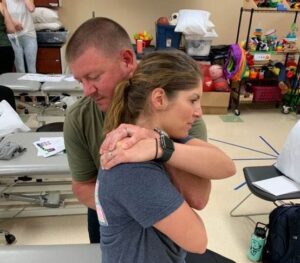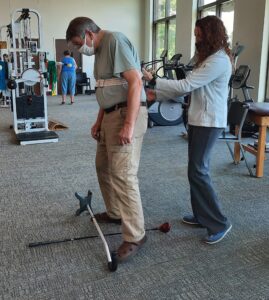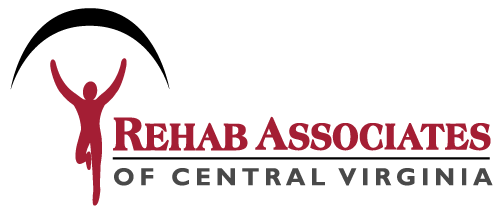
By: Josh Bailey, PT, DPT, OCS, CPED
Josh or Dr. Bailey? Both are correct. At Rehab Associates, we like to build personal relationships with our patients, so many call us by our first names, but since 2016, in order to be licensed, a physical therapist must earn a Doctor of Physical Therapy (DPT) from an accredited school. What does this mean to you as a patient and why is that important? To answer these questions, we need to take a look back at the changes in physical therapy.

Dr. Josh Bailey, president and CEO of Rehab Associates
History of DPT in Physical Therapy
In 1996, the first Doctorate of Physical Therapy programs were offered to students wanting to become physical therapists. A four-year program followed by a three-year doctoral program soon became the best-practice standard for the industry. By 2016, all new graduates were required to have a Doctor of Physical Therapy in order to practice. This additional level of education reflects a deeper commitment to professionalism, to continuing education, and most of all, to enhanced patient care.
Currently, physical therapists graduate from an accredited program with the competencies required to enter into clinical practice and to be eligible for state licensure. In today’s healthcare environment, clinicians must have a higher level of knowledge and skills including – but not limited to – general orthopedics and specialty care, pharmacology, diagnostic imaging, reimbursements, legal and ethical issues. The complexity of patient needs requires a greater understanding of how to treat a variety of conditions and injuries. Therefore, a doctorate-level education with supervised clinical hours is a necessity for well-rounded, high-level physical therapists. A doctoral education further equips physical therapists with critical thinking skills and clinical reasoning ability to excel in this complex healthcare field.
Continuing Education in the PT Field
Physical therapists are required to earn continuing education hours to maintain the DPT and, frankly, to be the best that he or she can be. Lifelong learning and professional development are critical to staying current with advancements and best practices in the industry. Commitment to continuing education demonstrates the physical therapists’ commitment to professional growth and to providing the best in patient care.

Matthew Rudder, PTA, and Dr. Lindsay Harvey attended a cervical class.
At Rehab Associates, our physical therapists pursue specialty certifications and earn additional credentials which further represents dedication to patient care. Our PTs specialize in general orthopedics, concussion and vestibular rehabilitation, dry needling, foot and ankle pain, orthotics, head, neck and facial pain (including TMJ), geriatrics, back pain, industrial rehabilitation and injury prevention, aquatics, Parkinson’s Disease, and more. As a company, we provide allocations that are three times the national average annually for continuing education, which indicates our commitment to our employees and to our patients. Quality continuing education paves the way for providing the most effective evidence-based care and attaining the best clinical outcomes for our patients.
We also provide an Accelerated Mentorship Program (AMP) that pairs new therapists with seasoned ones to ensure a targeted approach to professional development. This allows us to spend valuable time with our new hires educating them about evidenced-based procedures, best practices, and the use of our electronic medical record systems. We track our patient outcomes through Focus on Therapeutic Outcomes or FOTO, an industry-leading outcomes management system that provides real-time information on treatment effectiveness and efficiency.
Our commitment to continuing education and to evidenced-based outcomes is beneficial for our clinical team and for our patients.
Direct Access in Physical Therapy
One of the major reasons that physical therapists must attain the level of DPT is to provide the best care for the patients who are coming to us through Direct Access. Currently, patients in Virginia with private insurance coverage are allowed to schedule physical therapy without a script from a doctor. This allows PTs to assess musculoskeletal issues and injuries in a timely manner. The DPT education provides the knowledge and experience for physical therapists to evaluate and treat each individual. Thus, patients can obtain relief more quickly and from a provider of their choice.

Direct Access to physical therapy benefits the patient. Dr. Jo Cunningham enjoys helping patients with gait & balance issues.
At Rehab Associates, we diagnose and treat patients of all ages. We work to enhance movement and increase the ability of our patients to accomplish daily activities of living. We develop a comprehensive physical therapy program to improve movement, reduce pain, restore function, and prevent disability. By coming to us through Direct Access, our patients have a choice regarding their own healthcare. Our physical therapists must have the highest level of education possible in order to provide the best service with the best outcomes for our valued patients.
Conclusion
Rehab Associates wants only the best for our patients and our team. Physical therapy is more advanced today than it ever has been and our physical therapists have more medical and administrative responsibility than ever before. It only makes sense that we have advanced degrees that include hundreds of clinical hours. Our patients deserve the best and that’s all we provide at Rehab Associates.
If you need evidenced-based care for a condition or injury, please contact Rehab Associates at 855-722-8478. For an introduction to our team, visit https://racva.com/#ourstaff
